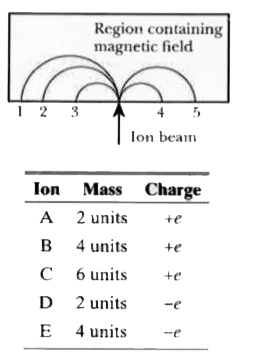Consider the following ionisation reactions:

If monovalent positive ion of A, divalent positive ion of B and trivalent positive ion of C have zero electron. Then incorrect order of corresponding I.E. is:
C3>B2>A1
B1>A1>C1
C3>C2>B2
B2>C3>A1
The correct Answer is:D
A⇒H(1s1)
B ⇒He(1s2) C⇒Li(1s22s1)

Topper's Solved these Questions
- CLASSIFICATION OF ELEMENTS AND PERIODICITY IN PROPERTIES BOOK - VMC MODULES ENGLISHCHAPTER - CLASSIFICATION OF ELEMENTS AND PERIODICITY IN PROPERTIES EXERCISE - LEVEL -2 Numerical Value Type for JEE Main
13 Videos
- CLASSIFICATION OF ELEMENTS AND PERIODICITY IN PROPERTIES BOOK - VMC MODULES ENGLISHCHAPTER - CLASSIFICATION OF ELEMENTS AND PERIODICITY IN PROPERTIES EXERCISE - JEE MAIN (ARCHIVE)
13 Videos
- CLASSIFICATION OF ELEMENTS AND PERIODICITY IN PROPERTIES BOOK - VMC MODULES ENGLISHCHAPTER - CLASSIFICATION OF ELEMENTS AND PERIODICITY IN PROPERTIES EXERCISE - LEVEL -1
75 Videos
- CHEMICAL THERMODYNAMICS BOOK - VMC MODULES ENGLISHCHAPTER - CHEMICAL THERMODYNAMICS EXERCISE - IN - CHAPTER EXERCISE - L
10 Videos
- ELECTROCHEMISTRYBOOK - VMC MODULES ENGLISHCHAPTER - ELECTROCHEMISTRYEXERCISE - IMPECCABLE
50 Videos
Similar Questions
Consider the following ionsisation reaction :
IE(KJmol−1) IE(KJmol−1)
A(g)→A+(g)+eө,A1 B(g)→B+(g)+eө,B1
B+(g)→B+2(g)+eө,B2 C(g)→C+(g)+eө,C1
C+(g)→C+2(g)+eө,C2 C+2(g)→C+3(g)+eө,C3
If monovalent positive ion of A, divalent positive ion of B and trivalent positive ion of C have zero electron. Then incorrect order of corresponding I.P. is :
View SolutionConsider the following ionsisation reaction :
IE(KJmol−1) IE(KJmol−1)
A(g)→A+(g)+eө,A1 B(g)→B+(g)+eө,B1
B+(g)→B+2(g)+eө,B2 C(g)→C+(g)+eө,C1
C+(g)→C+2(g)+eө,C2 C+2(g)→C+3(g)+eө,C3
If monovalent positive ion of A, divalent positive ion of B and trivalent positive ion of C have zero electron. Then incorrect order of corresponding I.P. is :
View Solution
Knowledge Check
Consider the following ionsisation reaction :
IE(KJmol−1) IE(KJmol−1)
A(g)→A+(g)+eө,A1 B(g)→B+(g)+eө,B1
B+(g)→B+2(g)+eө,B2 C(g)→C+(g)+eө,C1
C+(g)→C+2(g)+eө,C2 C+2(g)→C+3(g)+eө,C3
If monovalent positive ion of A, divalent positive ion of B and trivalent positive ion of C have zero electron. Then incorrect order of corresponding I.P. is :AC3>B2>A1BB1>A1>C1CC3>C2>B2DB2>C3>A1Ln3+ (trivalent lanthanides ions ) have electronic configuration.
A[Xe]4fto[Xe]4f14B[Xe]4d14fto[Xe]4d14f14C[Xe]4d24f0to[Xe]4d14f14D[Xe]4f0to[Xe]4f14Dissociation of an electrolyte in water into negative and positive ions is called
AionisationBelectrolysisCdecompositionDhydrolysis
Give reason : Metals form positive ions.
View SolutionName the following components of electrolysis: (b) The positively-charged ion
View SolutionThe region that contains free electrons, negative ions and positive ions is
View SolutionWhich one of the following statements about positive ions is incorrect?
View Solution
Which ion falls at position 2 ?
View Solution
